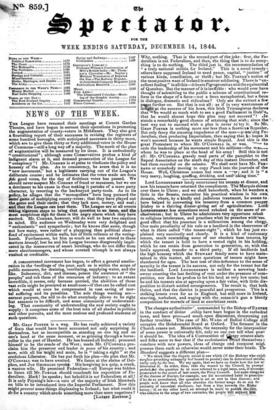Lord LONDONDERRY lately entertained his tenants at dinner, and now
his tenants have returned the compliment. TheMarquis shines over there in Ulster ; and we shall henceforth, when he wanders a, little in the Senate, remember his practical wisdom in his own domain, where, by a kindly and judicious treatment, he seems to have helped in converting his tenantry from a common pauper. Irishry to a thriving dinner-giving set of agriculturists; Lord' LONDONDERRY has sometimes stood rebuked on the score of es- clusiveness ; but in Ulster he administers very opportune rebuk to religious intolerance, and practises what he preaches with -.sue. good effect that his presence is a millennium among the clergy. One main peculiarity of his rule as a landlord is the observance of what is there called "the tenant-right"; which he has just ex- plained very succinctly and clearly. It is a kind of customary tenure, much resembling some of our obsolete base tenures, by which the tenant is held to have a vested right in his holding, which he can retain from generation to generation, or, with the lord's approval, transfer to a third party. If all landlords had. the high honesty which the STEWART family seem to have main- tained in this matter, all mere questions of tenure might have slumbered for ages. The best test of this deference to the sense of security in the tenant is its success, not only for the tenant but for the landlord. Lord LONDONDERRY is neither a screwing land- owner exacting the last farthing of rent under the pressure of com- petition, nor does he profess to let his land at very low rents; but he and his tenants aim at agreeing upon a fair value, with little dis- position to disturb settled arrangements. The result is, that both thrive, and that the district is peaceful and prosperous. This is a striking lesson even for us in England, but still more in Ireland, starving, turbulent, and waging with the assassin's gun a bloody competition for morsels of land at exorbitant rents. ,


























